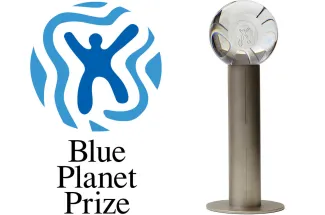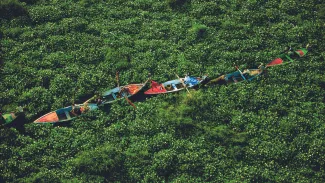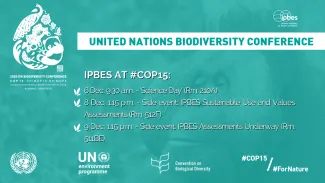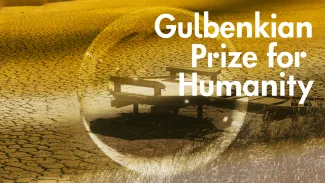
Two New IPBES Assessments: Co-Chairs Announced & Work Begins on Nexus and Transformative Change Reports
Media Release
Issued by the IPBES Secretariat on 27 January 2022
Two New IPBES Assessments: Co-Chairs Announced & Work Begins on Nexus and Transformative Change Reports
Bonn, Germany – The Intergovernmental Platform on Biodiversity and Ecosystem Services (IPBES) today announced six new co-chairs – three each to lead work on two major new multi-year international scientific assessments.
The IPBES assessment of the interlinkages among biodiversity, water, food and health (the ‘Nexus Assessment’) will be led by Prof. Paula Harrison (UK) from the UK Centre for Ecology & Hydrology; Prof. Pamela McElwee (USA) from Rutgers, the State University of New Jersey; and Dr. David Obura (Kenya) of CORDIO East Africa.
The IPBES assessment of the underlying causes of biodiversity loss, the determinants of transformative change, and options for achieving the 2050 vision for biodiversity (the ‘Transformative Change Assessment’) will be co-chaired by Prof. Arun Agrawal (India & USA) from the University of Michigan; Prof. Lucas Garibaldi (Argentina) from the National University of Río Negro; and Prof. Karen O’Brien (USA & Norway) from the University of Oslo.
Announcing the appointments, Dr. Anne Larigauderie, Executive Secretary of IPBES said: “We warmly congratulate all six new IPBES co-chairs and thank them for their commitment of time, expertise and energy over the next three years, to better inform policy and decisions about biodiversity and nature’s contributions to people. These new IPBES assessments will be among the most complex and interdisciplinary ever undertaken.”
Speaking about the significance of the assessments, Profs. Harrison, McElwee and Dr. Obura said: “Since the publication of the IPBES Global Assessment, in 2019, Governments and other decision-makers have increasingly realized the importance of addressing the loss of biodiversity and the degradation of nature’s contributions to people holistically and with great urgency. The Nexus Assessment will help inform consideration of synergies and trade-offs in terms of social, economic and environmental impacts.”
Profs. Agrawal, Garibaldi and O’Brien added: “The Transformative Change Assessment will offer practical options for concrete action to foster, accelerate and maintain the transformative change necessary for a more sustainable future.”
Hundreds of leading international experts, from every region of the world, will contribute as authors to the assessments. Following three years of writing, and at least two public rounds of expert peer review, both Assessment Reports are expected to be considered by representatives of the almost 140 member States of IPBES in 2024 – at the eleventh session of the IPBES Plenary.
“The IPBES Global Assessment provided the scientific basis for the post-2020 global biodiversity framework that will be agreed by governments later this year at CBD COP 15,” said Dr. Larigauderie. “The Nexus and Transformative Change Assessments will build on that evidence and data – helping decision-makers at all levels to better implement the actions needed to meet these goals and targets for people and for nature.”
Further information about the Nexus Assessment can be found at: https://ipbes.net/nexus and about the Transformative Change Assessment at: https://ipbes.net/transformative-change
FOR ENQUIRIES & INTERVIEWS: [email protected]
Note to Editors:
About IPBES:
IPBES is an independent intergovernmental body comprising almost 140 member Governments. Established by Governments in 2012, it provides policymakers with objective scientific assessments about the state of knowledge regarding the planet’s biodiversity, ecosystems and the contributions they make to people, as well as the tools and methods to protect and sustainably use these vital natural assets. To some extent IPBES does for biodiversity what the IPCC does for climate change. For more information about IPBES and its assessments visit www.ipbes.net
Prof. Paula Harrison (Nexus Assessment): is Principal Natural Capital Scientist at the UK Centre for Ecology & Hydrology and Professor of Land and Water Modelling at Lancaster University. Prof. Harrison specialises in working across sectors and disciplines to integrate different types of knowledge for supporting evidence-based decision-making. Her work focuses on developing integrated scenario and modelling platforms that enable exploration of the effects of multiple drivers (including climate change) on the interlinkages between biodiversity, agriculture, forestry, water resources and urban development.
Prof. Pamela McElwee (Nexus Assessment): is Professor of Human Ecology in the School of Environmental and Biological Sciences at Rutgers, The State University of New Jersey. Her primary research interests revolve around how communities and households are impacted by and adapting to environmental change, and how policies and governance can help or hinder sustainability efforts. She has conducted research in Southeast Asia on these topics for more than two decades. She also leads the Cultural Practices and Ecosystem Management Thematic Group for IUCN and is currently Chapter Lead for Ecosystems for the Fifth US National Climate Assessment.
Dr. David Obura (Nexus Assessment): is a Founding Director of CORDIO East Africa, a non-profit research organization supporting sustainability of coral reef and marine systems in the Western Indian Ocean. Dr. Obura's primary research is on coral reef resilience, in particular to climate change, and supporting coral reef and ocean monitoring frameworks and reporting globally. His work has grown around tropical coastal sustainability challenges, and marine regions as a supporting framework for cooperation and linking local efforts to global sustainability goals and targets. He chairs the IUCN Coral Specialist Group and serves on the Earth Commission.
Prof. Arun Agrawal (Transformative Change Assessment): is Samuel Trask Dana Professor of Sustainability and Development at the School for Environment and Sustainability, University of Michigan. His research focuses on international development, institutional change, environmental conservation, and sustainability. He has written critically on environmental governance, indigenous knowledge, community-based conservation, common property, and environmental identities. He is an elected member of the US National Academy of Sciences.
Prof. Lucas Garibaldi (Transformative Change Assessment): is Principal Investigator at the National Scientific and Technical Research Council of Argentina (CONICET), Professor at the National University of Río Negro (UNRN), and Director of the Research Institute on Natural Resources, Agroecology and Rural Development (IRNAD). His work targets global socio-environmental problems through biodiversity-based solutions with special emphasis on the production of nutritious food and human health. He has been able to cooperate with family farmers around the globe to facilitate and encourage their transition to low-cost, high-yield, nature-friendly farming practices.
Prof. Karen O’Brien (Transformative Change Assessment): is a Professor in the Department of Sociology and Human Geography at the University of Oslo, Norway. Prof. O'Brien's current research focuses on integrative approaches to transformations to sustainability. Other research by Prof. O’Brien has focused on links between climate change adaptation and transformation, environmental change and globalization, the implications of climate change for human security, the values and visions of youth related to the future in a changing climate, and the relationship between tropical deforestation and climate change.






